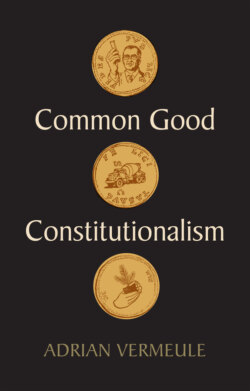Читать книгу Common Good Constitutionalism - Adrian Vermeule - Страница 16
Abuse of Power?
ОглавлениеLibertarians and liberals find the classical tradition appalling or, worse, irrelevant. Both express, along varying lines, the fear that talk of “the common good” is just a shorthand for the preferences of those in power, and worry above all about abuses of power – although libertarians and liberals tend to focus on different abuses, the former worrying mostly about regulatory abuses, the latter about the imposition of public morality that constrains personal expression and elite “experiments in living.” Abuse of power is indeed an evil, and I will have a great deal to say about it in this book. But fear of the common good is mistaken in two ways, institutional and conceptual.
First, we have to take on board the insight of progressives like Dewey that power is always conserved.28 Any claim to “liberty” is a claim for a legal allocation of power to do or not to do or to prevent others from doing or not doing. Hence abuses of power are hardly confined to government actors or the state. Corporations acting under public charters, and nominally “private” actors wielding power under common-law rules of property and contract created and enforced by judges – that is, by a class of government officials – can and frequently do abuse a kind of delegated public power. It is a mistake to focus myopically on direct abuses of power by officials themselves, as opposed to indirect abuses of power made possible by the law.
Second, and more fundamentally, the common good is not “preferences” or “what I like” or “whatever the ruler imposes at whim.” It is not an aggregation of individual goods, as in utilitarianism, let alone the interests of the state apparatus, as in certain forms of “Government House utilitarianism.”29 Rather, as I discuss in Chapter 1, the common good is well-ordered peace, justice, and abundance in political community; the flourishing of the political community is also the greatest temporal good for the individual.
The last part is crucial. Libertarians, usually implicitly, read “the common good” as “the good of the collective” or, even worse, “the good of the state apparatus” and then oppose that to the good of individuals. In a utilitarian variant, they interpret the common good as the aggregate utility of individuals summed up according to some social welfare function, and then oppose this aggregate good to the rights of individuals. None of this gets at the truly common good of happiness in a flourishing political community, which is unitary, capable of being shared without being diminished, and the highest good for individuals as such.
